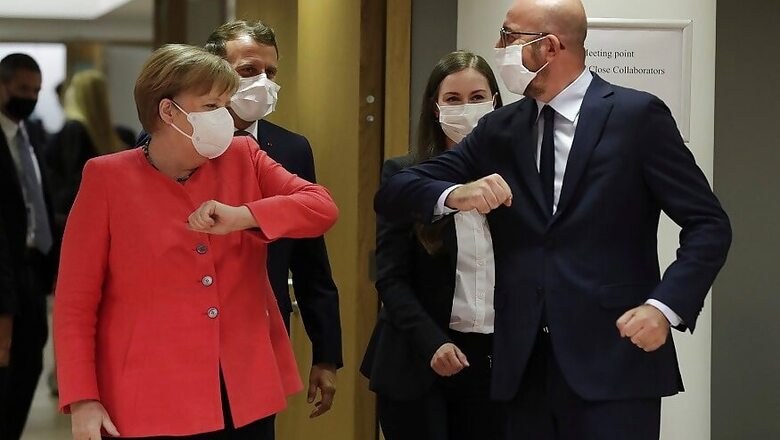
views
EU leaders battled to save a beleaguered 750-billion-euro ($860-billion) virus recovery package at a summit on Sunday, as global deaths soared past 600,000 and Hong Kong raised the alarm about its growing outbreak.
The United States -- the worst-affected country by far -- ended a week in which it registered its highest figures for new cases for three days running, taking its total towards 3.7 million infections and 140,00 deaths.
The virus has now infected more than 14 million people worldwide.
With clusters cropping up from Spain to Australia, officials were again facing the dilemma of imposing lockdowns to protect public health or loosening restrictions to save struggling businesses.
Illustrating the shrinking room for manoeuvre, angry demonstrators took to the streets in Israel to protest against their government's handling of the crisis.
And scientists, too, were feeling the pressure as Britain ramped up its tit-for-tat row with Russia on Sunday over claims Kremlin agents hacked into British labs where virus vaccines are being developed.
Economic recovery is at the forefront of policymakers' minds in Europe, with the continent facing a crippling recession and still unable to agree on the terms of its massive package to help the most-affected countries.
In a heartfelt speech, EU Council President Charles Michel reminded the bloc's 27 leaders of the devastating human cost of the pandemic -- 600,000 dead including 200,000 in Europe -- and urged them to come together to complete a "mission impossible".
"The question is this: are the 27 leaders, responsible for the people of Europe, capable of building European unity and trust?" Michel said.
"Or will we present the face of a weak Europe, undermined by mistrust?"
The summit was supposed to frame the terms of the rescue deal but a handful of countries led by the Netherlands are reluctant to hand over such vast sums to nations they regard as profligate -- particularly Spain and Italy.
There was disunity, too, on the fringes of the EU, with Britain and Russia renewing their feud over Moscow's alleged spying on British scientists.
"We're absolutely confident that the Russian intelligence agencies were engaged in a cyberattack on research and development efforts in organisations in this country," said British Foreign Secretary Dominic Raab, echoing accusations made by several countries earlier this week.
Russia's London ambassador dismissed the claim, saying "there is no sense in it", adding: "In this world, to attribute any kind of computer hackers to any country, it is impossible."
With tens of thousands of new infections each day and hundreds of deaths, the US is struggling to frame a consistent response to the crisis -- attempting to open up the economy even while the tolls mount.
Other nations are grappling with the same dilemma, Spain opting for local lockdowns and non-enforced stay-at-home advice in its Catalonia region.
Officials in the Australian state of Victoria have taken a tougher approach.
Face masks will be mandatory for roughly five million people in and around Melbourne from Thursday, with the threat of $140 fines for transgressors.
"Most of us wouldn't leave home without our keys, we wouldn't leave our home without our mobile phone. You won't be able to leave home without your mask," said Victoria Premier Daniel Andrews.
In France, too, people will risk a fine of 135 euros ($154) starting Monday for failure to comply with a new decree to wear a mask in public places indoors.
Hong Kong also stiffened its measures, with leader Carrie Lam confirming on Sunday daily infections passing 100 for the first time in the territory.
Lam had already ordered business closures and made facemasks compulsory on public transport, but she said it would soon be mandatory to wear them inside any public indoor venue.
However, such restrictions have not gone down well with some in Israel where a second wave of infections emerged after the government allowed businesses to reopen en masse in late April and early May.
Police fired water cannon to disperse thousands of protesters overnight.
They had gathered in Jerusalem and Tel Aviv to register their fury -- some at the reimposition of shutdowns, others with the failure to improve testing capacity.
In Europe too, there were signs of growing frustration, particularly among youngsters starved of social life.
Police in the German city of Frankfurt said they were met with "a hail of bottles" when they tried to break up an open-air party in the city centre involving thousands of youngsters.
So-called corona parties have broken out in the city's squares as bars and clubs remain closed to contain the spread of the virus.
While bars, restaurants and other public spaces endure a lockdown across the world, sporting and cultural events continue to feel their way back into the public realm.
Japanese sumo is the latest to announce a comeback and, unlike many other sports, fans are now allowed into arenas. "It's the feeling of being here, being present," said Katsuhiko Ochiai as he prepared for Sunday's tournament. That's what watching spectator sports is all about, isn't it. Like music. Like sumo."
Turkey suspended flights to Iran and Afghanistan "as a precaution" less than a week after air traffic resumed following a five-month interruption because of the coronavirus pandemic.
South Africa's death toll from coronavirus has passed the 5,000 mark, after 85 new deaths were reported in the previous 24 hours.




















Comments
0 comment